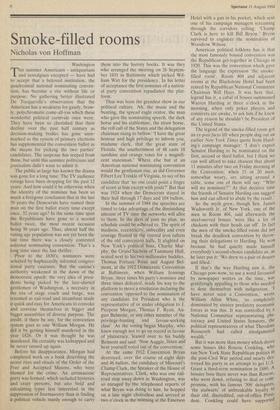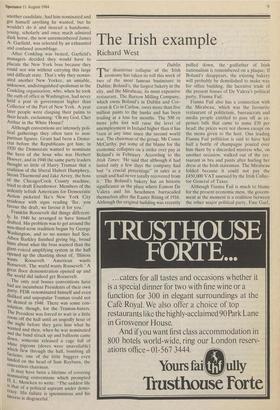Smoke-filled rooms
Nicholas von Hoffman
Washington rrhis summer Americans - antiquarians 1 and nostalgiacs excepted — have had to accept that a beloved institution, the quadrennial national nominating conven- tion, has become a rite without life or purpose. No gathering better illustrated De Tocqueville's observation that the American'has a weakness for gaudy, braw- ly, polychromatic come-all-yas which these wonderful political carnivals once were. They have been so cherished that their decline over the past half century as decision-making bodies has gone unre- marked as the system of primary elections has supplemented the convention ballot as the means for picking the two parties' candidates. The suspense has seeped from them, but until this summer politicians and journalists didn't want to admit it.
The public at large has known the drama was gone for a long time. The TV audience ratings have been dropping for the past 12 years. And how could it be otherwise when the identity of the nominee has been so much a foregone conclusion that in the last 50 years the Democrats have named their man on the first ballot every time except once, 32 years ago? In the same time span the Republicans have gone to a second ballot twice, the most recent occasion being 36 years ago. Thus, almost half the voting age population was not yet born the last time there was a closely contested national nominating convention. That's a long time since the last thriller.
Prior to the 1830's, nominees were selected by haphazardly informal congres- sional party caucuses. But the caucus's authority weakened in the dawn of the democratic epoch: the very idea of presi- dents being picked by the lace-shirted gentlemen of Washington, a necessity in the era of stage coach and barge, was resented as rail-road and steamboat made it quick and easy for Americans to convoke and convene themselves in bigger and bigger assemblies of diverse purpose. The credit, if there be any, for the convention system goes to one William Morgan. He did it by getting himself murdered in the year 1826. Or it was thought he was murdered. He certainly was kidnapped and he never turned up again.
Before his disappearance, Morgan had completed work on a book describing the secret rites and rituals of the Order of the Free and Accepted Masons, who were blamed for the crime. An antimasonic party was formed, which included hysterics and crazy persons, but also bold and calculating types less interested in the suppression of freemasonry than in finding a political vehicle sturdy enough to carry them into the history books. It was they who arranged the meeting on 26 Septem- ber 1831 in Baltimore which picked Wil- liam Wirt for the presidency. In his letter of acceptance the first nominee of a nation- al party convention repudiated the plat- form.
Thus was born the grandest show in our political culture. Ah, the music and the bunting, the spread eagle orator, the man who gave the nominating speech, the dark horse and his stablemate, the straw horse, the roll call of the States and the delegation chairman rising to bellow: 'I have the great honour and high privilege to inform you, madame clerk, that the great state of Florida, the southernmost of 48 casts 18 sunshine and orange votes for a magnifi- cent statesman.' Where else but at an American national nominating convention would the gentleman rise, as did Governor Elbert Lee Trinkle of Virginia, to say of his candidate that 'no one could point a finger of scorn at him except with pride?' But that was 1924 when the Democrats stayed in their hall through 17 days and 104 ballots.
In the summer of 1984 the speeches are timed to take advantage of the diminishing amount of TV time the networks will allot to them. In the days of yore no plan, no schedule could be adhered to. The spirit of madness, eccentricity, imbecility and even courage floated in the riveted iron rafters of the old convention halls. It alighted on New York's political boss, Charlie Mur- phy, the Grand Sachem of Tammany Hall, seated next to his two millionaire buddies, Thomas Fortune Ryan and August Bel- mont, at the 1912 Democratic Convention at Baltimore, when William Jennings Bryan, three times his party's nominee and three times defeated, made his way to the platform to move a resolution declaring the convention 'opposed to the nomination of any candidate for President who is the representative of or under obligation to J. Pierpont Morgan, Thomas F. Ryan, Au- gust Belmont, or any other member of the privilege-hunting and favour-seeking class'. As the voting began Murphy, who knew enough not to go on record in favour of plutocracy, leaned over to his buddy Belmont and said: 'Now Auggie, listen and hear yourself voted out of the convention.'
At the same 1912 Convention Bryan destroyed, over the course of eight days and 46 ballots, the candidacy of Missouri's Champ Clark, the Speaker of the House of Representatives. Clark, who was one rail- road stop away down in Washington, was so enraged by the telephoned reports of what Bryan was doing to him, he hopped on a late night choo-choo and arrived at two o'clock in the morning at the Emerson Hotel with a gun in his pocket, which sent one of his campaign managers screaming through the corridors yelling: 'Champ Clark is here to kill Bill Bryon.' Bryon survived to engineer the nomination of Woodrow Wilson.
American political folklore has it that the most famously bossed convention was the Republican get-together in Chicago in 1920. This was the convention which gave the language the expression 'the smoke- filled room'. Room 404 and adjacent rooms at the Blackstone Hotel had been rented by Republican National Committee Chairman Will Hays. It was here that, legend has it, a cabal of bosses summoned Warren Harding at three o'clock in the morning, when only poker players and connivers are awake, to ask him if he knew of any reason he shouldn't be President of the United States.
The legend of the smoke-filled room got an ex-post facto lift when people dug out an earlier New York Times quote from Hard- ing's campaign manager: 'I don't expect Senator Harding to be nominated on the first, second or third ballot, but I think we can well afford to take chances that about 11 minutes after two on Friday morning at the Convention, when 15 or 20 men, somewhat weary, are sitting around a table, some one of them will say: "Who will we nominate?" At that decisive time the friends of Senator Harding can suggest him and can afford to abide by the result.'
So the myth grew, though Sen. James Wadsworth Jr, of New York, one of the men in Room 404, said afterwards the steel-nerved bosses 'were like a lot of chickens with their heads cut off'. In fact the men of the smoke-filled room did not break the deadlock convention by throw- ing their delegations to Harding. He won because he had quietly made himself everybody's second-choice candidate or, as he later put it: 'We drew to a pair of deuces and filled.'
If that's the way Harding saw it, the Chicago pow-wow, to use a word favoured by newspaper writers or the time, was gratifyingly appalling to those who needed to dose themselves with indignation. 'I have never seen a Convention,' wrote William Allan White, 'so completely dominated by sinister predatory economic forces as was this. It was controlled by a National Committee representating plu- tocracy and United States Senators, the political representatives of what Theodore Roosevelt had called amalgamated wealth.'
But it was more than money which drove some bosses like Roscoe Conkling, who ran New York State Republican politics In the post-Civil War period. and nearly des- troyed his party in an attempt to get U.S• Grant a third-term nomination in 1880. A bossier boss there never was than Roscoe, who went down, refusing to deal or com- promise, with his famous '306' delegates, 'the stalwarts' of unbreakable loyalty to their old, discredited, out-of-office Presi- dent. Conkling could have supported
another candidate, had him nominated and got himself anything he wanted, but he wouldn't do it and instead a handsome, young, scholarly and once much admired dark horse, the now unremembered James A. Garfield, was selected by an exhausted and confused assemblage.
After Conkling was bested, Garfield's managers decided they would have to placate the New York boss because they could not win without carrying this large and difficult state. That's why they nomin- ated another New Yorker, an amiable, unknown, undistinguished spoilsman in the Conkling organisation, who, when he took the oath of office in Washington, had never held a post in government higher than Collector of the Port of New York. A year later people were clasping their palms to their heads, exclaiming: 'Oh my God, Chet Arthur in the White House" Although conventions are intensely poli- tical gatherings they often turn to non- partisan figures. Grant had been a Demo- crat before the Republicans got him; in 1920 the Democrats wanted to nominate the hero of the hour who was Herbert Hoover, and in 1948 the same party leaders thought so little of Harry Truman that a coalition of the liberal Hubert Humphrey, Strom Thurmond and Jake Arvey, the boss of the Chicago/Cook County machine, tried to draft Eisenhower. Members of the ardently leftish Americans for Democratic Action picketed Ike's New York City residence with signs reading 'Ike, you favour the draft, we favour it for you.'
Franklin Roosevelt did things different- ly. In 1940 he arranged to have himself drafted. His problem was to get around the non-third-term tradition begun by George Washington, and so no sooner had Sen. Alben Barkley finished giving big, broad hints about what the boss wanted than the giant-voiced amplifying system in the hall opened up the chanting shout of, 'Illinois wants Roosevelt. American wants Roosevelt. The world wants Roosevelt.' A great floor demonstration opened up and the world did indeed get Roosevelt. The only real bosses conventions have had are incumbent Presidents of their own party. FDR renominated himself and even disliked and unpopular Truman could not be denied in 1948. There was sonic con- solation, though, for the Truman-haters. The President was forced to wait in a little room off the hall until an ungodly hour of the night before they gave him what he wanted and then, when he was nominated and the band struck up and balloons came down, someone released a cage full of Mute pigeons (doves were unavailable) which flew through the hall, bombing all _factions; one of the little buggers even landed on the head of Sam Rayburn, the convention chairman. It may have been a lifetime of covering nominating conventions which prompted !-I• L. Mencken to write: "The saddest life is that of a political aspirant under demo- cracy. His failure is ignominious and his success is disgraceful.'







































 Previous page
Previous page